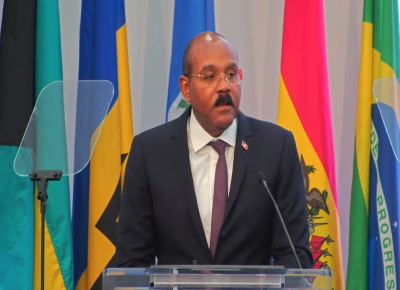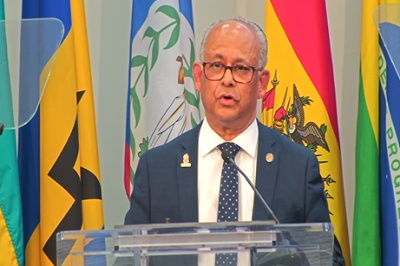
By Staff Writer
ST. JOHN’S, Antigua, Jun 25, CMC – The 55th General Assembly of the Organization of American States (OAS) began here on Wednesday night against the backdrop of financial problems, an uncertain global environment and the need to remain agile, resourceful and unwavering in its mission to life every citizen of the Americas.
“Let us leave this general assembly with a renewed purpose and for the Americas to remain a place of peace,” said OAS Secretary General, Albert Ramdin, the first ever Caribbean Community (CARICOM) national to head the 35-member grouping since its inception in 1948.
Host Prime Minister Gaston Browne said that his country was hosting the general assembly because “we believe in the OAS’s potential as our region’s convening force.
“Let our deliberations this week ignite a new era of cooperation, shared responsibility and mutual respect,” he said, adding, “as we open this general assembly, may the flame of solidarity light up our path and rekindle our shared purpose”.
Ramdin, a former OAS assistant secretary general and foreign affairs minister of Suriname, in his first address to the general assembly since his election in March this year, said the theme of the three-day conference “captures both a shared hemispheric aspiration and a concrete commitment to advancing the well-being of our people.
“It also underscores the need for renewed collective action at a time when growth, resilience, and inclusivity are more than just ideals.”
The three-day general assembly, which is being held in Antigua and Barbuda for the first time, is taking place under the theme “Building Resilient, Inclusive Economies in the Americas,” and Ramdin reminded the audience that “we live in unpredictable and uncertain times.
“We observe a weakening of the decade-long commitment to global cooperation based on international law and the rules-based international architecture. The global context marked by geopolitical tensions, socio-economic volatility, and rapidly evolving technologies demonstrates the challenging and complex world we live in today.”
Ramdin said that the OAS, as an institution in this new dispensation, stands ready to work with governments, inter-American institutions, civil society, and the private sector to create a democratic, prosperous, and secure hemisphere.
But he acknowledged that in the face of the current complex challenges, “we cannot rely on ur mission on relying solely on past practices and acting in isolation.
“It cannot be business as usual anymore,” he said, noting also the financial constraints facing the hemispheric body.

He said that a recent evaluation of the OAS “underscored the critical point, financial stability is not a marginal concern” and that “adequate funding is essential to preserving the organisation’s success.
“Without a solid financial foundation, the OAS cannot fulfill its mandate or respond effectively to the evolving needs of our region,” Ramdin warned, adding “our budget should be based on a rationale and prioritised articulation of what is required to operate effectively and the financial strategy to meet those needs”.
Prime Minister Browne told the delegates, “Let us be blunt, today’s OAS budget falls short.
Staffing levels lag behind mounting demands in areas such as countering organised crime, cooperation in curbing drug trafficking, tackling cybercrime, and promoting international cooperation”.
He said competing national political agendas have too often prevented consensus on resource allocation.
“We call on all member states to honour their commitments promptly, and to empower the OAS Secretariat to respond rapidly to crises, from democratic backsliding to protecting the human rights of every citizen in our hemisphere,” Browne said.
He said that in an era of great-power competition, ”our region must foster international engagement that takes the form of cooperation, rather than rivalry,” noting that when major economies work together, instead of erecting barriers, they unlock shared prosperity, driving innovation, investment, and trade that lift all partners.
Prime Minister Browne said a collaborative approach would enable large states to address global challenges more effectively, while ensuring that Latin American and Caribbean countries benefit fully from technology transfers, infrastructure financing, and market access.
“Let us urge every partner to set aside zero-sum thinking and embrace a spirit of partnership, one that recognises our hemisphere not as a battleground for influence, but as a bridge to mutual growth and sustainable development.”
As he has done on numerous other occasions, the Antigua and Barbuda prime minister warned of the impact of climate change on Small Island Developing States (SIDS), which he said, despite negligible contributions to global emissions, bear disproportionate costs from rising seas, stronger storms, coastal erosion, and ecological disruption.
“From rising sea levels to intensifying storms, every facet of life in the Americas is under assault,” he said, reminding the delegates of the opportunity they would have experienced in visiting some of the attractions of Antigua and Barbuda.
“Now imagine returning here after decades of unchecked global warming, only to find the island unrecognizable, its charm and quality washed away, or worse, sunk beneath the sea. That is the stark reality if climate change continues at its galloping pace.
“This is why we are fighting climate change. We are fighting for our homeland, for our civilization, for our very soul. Because we are small, we will be the first victims of this crisis, but our fate will be a harbinger of devastation that will visit every nation in the Americas in its measure.”
Browne said that every country has an obligation to future generations to act now: to slash greenhouse-gas emissions, to invest massively in renewable energy and resilient infrastructure, and to insist that the world’s largest emitters provide the necessary finance and technology.
“Only by doing so can we ensure that the next time you come to these shores, you return not to ruins, but to the same beauty, prosperity, and hope you found today,” he said, adding that “member states of the OAS, acting together, can forge a unified political response to this environmental crisis.
“I urge you to do so,” he said, adding that there is an urgent need to dismantle trade barriers, build transport and broadband corridors, and harmonise regulations that can unlock the promise of future prosperity.
“The OAS, uniquely empowered to convene governments, business, labour, and civil society, should launch a ‘Bridge to Prosperity’ initiative to forge the infrastructure and partnerships that unlock our shared potential.
“In the margins of this general assembly, I hope our governments, and the Secretary-General, will begin to explore this vital work and ignite a spark that can fuel such an ambitious endeavour.
“At the same time, we cannot ignore the scourge of transnational organised crime. Throughout our hemisphere, criminal networks traffic in drugs, weapons, and human beings, undermining governance and stifling development,” Prime Minister Browne added.
CMC/pr/ir/2025

